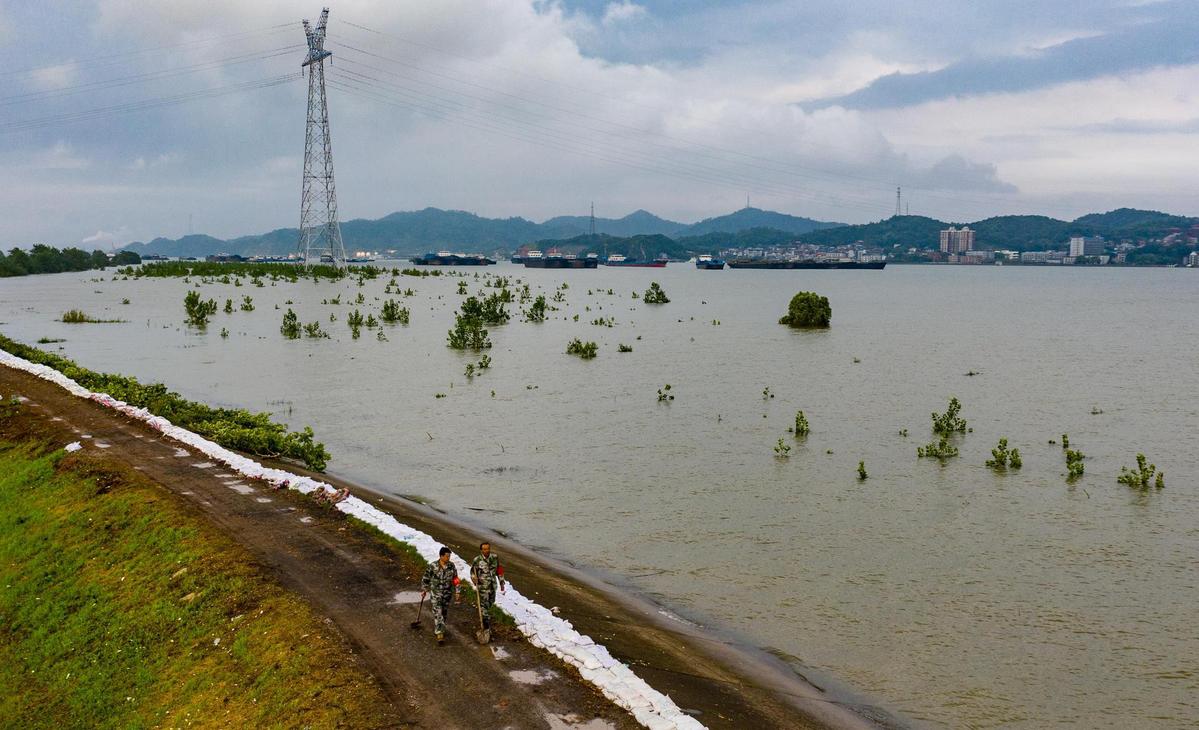Fighting floods at China's largest freshwater lake
Yu Zhongdai, a member of the Communist Party of China and deputy head of the Xingang township government, led locals to help contain the floods on the Dongsheng South Embankment facing Poyang Lake.
Yu Zhongdai carries a heavy sandbag and puts it down on the Dongsheng South Embankment to prevent water from overflowing. The tide is high and more sandbags are needed.
"I have been fighting the floods here for more than two weeks," said Yu, 33.
Yu is a member of the Communist Party of China and deputy head of the Xingang township government in Jiujiang city, east China's Jiangxi province. The township is situated between Poyang Lake, China's largest freshwater lake, and the country's longest waterway, the Yangtze River.

Sand bags are stacked at the Dongsheng South Embankment to prevent water from overflowing in Xingang township of Jiujiang city, east China's Jiangxi province, on July 18, 2020. [Photo/Xinhua]
China has entered its rainy season. Since June, continuous downpours have lashed large parts of southern China, and the waters of many rivers in the affected regions have exceeded warning levels.
The northern part of Jiangxi province has experienced heavy downpours since July 6, with water rising significantly in local rivers and lakes.
"On July 12, the water level at Poyang Lake reached beyond the guaranteed mark of 22.43 meters, posing a grave danger to the village of Yangjiachang in the vicinity," Yu said.
Amid this situation, Yu led locals to help contain the floods on the Dongsheng South Embankment facing the lake.
Against all odds
Poyang Lake is fed by several rivers within Jiangxi, and the lake's water flows into the Yangtze River. The water then flows eastward to the sea. As a conjunction point, the lake functions to adjust the water levels of rivers during drought and flood seasons.
"When the Yangtze floods, the floodwater goes into Poyang Lake," Yu said. "What we do is that we make sure the embankment is safe and fends off the rising water from flooding into the village."
The Dongsheng South Embankment is about 3 km long. Yu patrols it from daylight into the night to prevent any leaks.
"If we find any muddy water flowing out of the rear surface of the embankment, we use water-absorbing materials to cover it up, and dig small waterways on the spot to let the water go," he said. "As long as we retain the mud in the structure, it's OK."
Small leaks are commonplace, he said, because the structure consists of mud at the bottom, and water could seep through it.
"Animals, such as crayfish and eels, could dig holes in the structure, and the pressure from the lake pushes water through the holes too," he added.
"If a leaking hole is within a diameter of 5 cm, we deal with it by ourselves, otherwise we send for experts immediately," Yu said.
Patrolling the embankment also means walking in scorching heat and strong gusts of wind, but Yu said it is important to keep people safe.
For Yu, the most unforgettable day came on the night of July 12, when the water from the lake rose significantly, forming strong waves and constantly hitting the embankment.
"There were 700 to 800 people on the embankment that night to pile more sandbags to strengthen the structure," Yu recalled. "It hurt when the waves hit our faces."
The flood-fighters started in the afternoon and did not rest until the next morning.
"Currently we are short of manpower to fight the floods," he said. "But I heard that many migrant workers have returned to help, so it will be easier."
Responsibility of a CPC member
As an official, another important task for Yu is to evacuate local villagers, which he said is not easy.
"When the water reaches the warning level, we need to enhance patrolling, but when it exceeds the guaranteed level, villagers need to evacuate."
But many locals simply did not want to move.
"In Yangjiachang Village, most people are elderly, women, and children," Yu said. "Many senior people did not want to move because they wanted to look after their belongings, or because they did not have friends or relatives to turn to once they relocated."
Some elderly people refused to move because they underestimated the risks, believing the embankment patrollers would keep them safe.
"So we asked those willing to move to help persuade those who were reluctant," Yu said. "We also asked their children to talk them out of the danger."
The method worked, and the villagers have all relocated to a resettlement in the city.
Yu said the battle against the floods is the toughest in recent years because the water level at Poyang Lake reached a historic high.
"I think the flood season will last until early or mid-August," he said. "As a Party member and a government official, it is my duty to safeguard people's lives."
"We will continue to make every effort to win the battle against the floods," he said.

